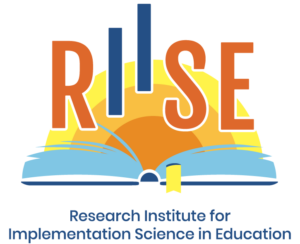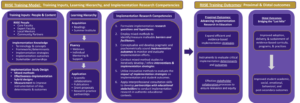
The Need for Education-Specific Implementation Research
There is considerable evidence for the effectiveness of a wide variety of educational curricula, programs, practices, and interventions; however, these innovations have been slow to enter typical education settings. This is because education research often is not accessible, usable, or relevant to teachers and other front-line practitioners and a large gap – known as the “last mile” problem in which education research fails to reach the individuals for whom it was intended – has repeatedly been observed between educational research and its application.
This research-practice gap reflects the need for education-specific implementation research that addresses the unique characteristics of school settings and the programs and practices that are the focus of implementation.
To address the “last mile” problem, RIISE aims to increase the number of educational scholars who conduct implementation research on how and why implementation strategies work in school settings. RIISE will recruit and train a diverse cadre of established education scholars to develop and map meaningful, value-added implementation research questions onto existing methods and design implementation studies.
The RIISE Model – Addressing the “Last Mile” Problem
The RIISE training program is adapted from existing frameworks for implementation training and will focus on the building blocks of implementation research and unique aspects of study design. Training content will be organized within the domains of (1) implementation determinants, (2) implementation strategies, (3) implementation outcomes, and (4) equitable community partnerships. RIISE will emphasize mixed-method quantitative-qualitative designs and data collection – hallmarks of implementation – throughout its content as well as hybrid effectiveness-implementation trial designs.

Six Implementation Research Competencies
RIISE Fellows will be supported to acquire, develop fluency, and eventually apply six implementation research competencies that integrate the domains of implementation research and our cross-cutting methodological foci. These competencies represent the culmination of knowledge acquired through the Institute, webinars, mentoring experiences and other learning activities and the application of that knowledge by training others and formulating implementation research studies:
- Formulate valued-added implementation-relevant research questions and hypotheses.
- Employ mixed-methods to identify and measure malleable implementation determinants (i.e., barriers and facilitators).
- Conceptualize studies to develop pragmatic, psychometrically sound implementation outcomes to monitor and evaluate implementation efforts.
- Conduct mixed-method research that informs the iterative development/refinement of usable innovations or feasible, cost-effective implementation strategies.
- Utilize innovative study designs (e.g., hybrid designs) to evaluate the impact of implementation strategies on both implementation and student outcomes.
- Utilize interprofessional consultation skills to develop equitable partnerships with educational stakeholders to conduct implementation research in authentic educational contexts.

The research reported here was supported by the Institute of Education Sciences, U.S. Department of Education, through Grant R305B210004 to University of Washington. The opinions expressed are those of the authors and do not represent views of the Institute or the U.S. Department of Education.